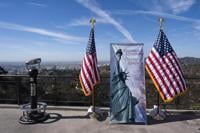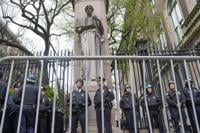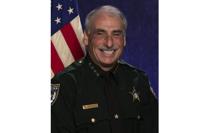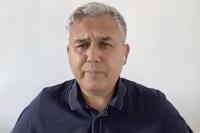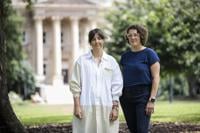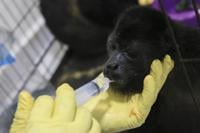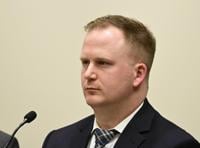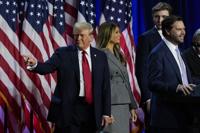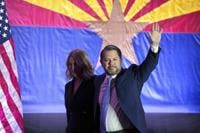LOS ANGELES (AP) — In the scenic hills overlooking Los Angeles, nine immigrants from countries spanning from Lebanon and Germany to Taiwan and Mexico took oaths to become new American citizens at an outdoor naturalization ceremony with the Hollywood sign in the background.
With the fast approaching, several said voting was at the top of their minds, and they knew who they wanted to win the 2024 election. One woman from France at the October ceremony pulled up the website to register to vote in California to ensure she could cast her ballot.
To become a naturalized American citizen, immigrants must live in the United States with a green card in most cases for five years, and pass English and civics tests.
Many said they hoped to travel with an American passport, participate in political life — and above all, feel they're full-fledged members of the country they love and for years have called home.
Getting the right to vote
Chia Hsin Tsai, 33, came to the United States from Taiwan 11 years to study for her master's degree. She is now a marketing manager in the food industry and and applied to become a citizen in March, hoping to make official the way she felt about the U.S.
She said she would definitely vote in the upcoming presidential election but declined to say for whom.
“Becoming a part of the country that I'm living in makes me feel special,” she said. “I live in this country. I can have a right to vote and everything.”
Her boyfriend, Eric Boyce, said seeing her worry about her visa expiring and working so hard to pursue her career is inspiring.
“She became an American not because she took a test, but because she was here for 11 years and learned everything about the U.S.,” he said.
Having a voice
Floriane Turcat, 37, said growing up in France, she was inspired by American movies and television and hoped to one day become an actor.
Now, Turcat acts in movies and on stage. She lives in Los Angeles with her husband, a web developer.
While she stood in line waiting to take her oath, Turcat pulled up the website to register to vote in California to be sure she would get it done in time to cast her ballot in the presidential election. She said she wants to vote for over concern for women’s rights and reproductive rights, in particular.
“I want to be part of the political movement of this country,” Turcat said.“Even though California is a Democratic state, I want to be able to participate and have a voice and state that it’s important for me. I want to stand for my rights.”
She said she applied to naturalize in July and was happy the process was completed quickly enough for her to be able to register to vote.
“I’ve always been fascinated by this country,” said Turcat, who has lived in the U.S. for seven years. “It was the symbol of freedom for me. I just loved everything about it.”
Embracing free speech
Phoenix De Los Angeles Lopez Daal said he has always wanted to become an American citizen. He said he believes in the country's ideals, including freedom of speech, freedom of religion and the right to bear arms.
He said voting wasn’t a major reason to naturalize, but he hopes to be able to cast a ballot in the presidential election for former
The 31-year-old set dresser came to the U.S. with his mother and sister from Venezuela when he was six years old.
Lopez Daal said he wouldn't register in any political party but he feels Democrats have shifted too far to the political left — something he said he also saw happen in his native country.
“There was a point in time where Venezuela was a great country, and the things the Democrats are doing are what led to the downfall of Venezuela. So I wouldn't really want that to be a thing here,” he said.
Protecting democracy
Dennis Beier, a 46-year-old film producer from Germany, said he saw the U.S. as a place of freedom and opportunity while growing up in Berlin.
He said he hopes he’ll be able to cast his ballot in this year’s presidential election for Harris, largely because of worries related to the Jan. 6 attack on the U.S. Capitol.
“I just want to keep like this whole democracy thing intact,” Beier said. “And people need to respect when they lose, that’s part of it, and if you can’t, then you should not be in politics.”
Bejer said he has always liked the U.S. since he first visited New York in 2001.
“It was kind of like a match, I thought, ‘yeah, this is it,’” said Beier, who lives in Los Angeles.
Beier said he wanted to naturalize to join his American children and his ���ϳԹ��� wife, who recently became a U.S. citizen. He said he previously held off until Germany changed its laws, making it easier to take an additional citizenship.
“I’m very happy that finally the day came,” he said.


